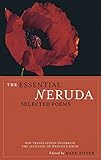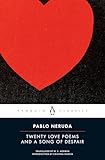When Pablo Neruda was expelled from France in 1952, he wrote this to his beloved countrymen in Chile: “The future of humanity may be endangered in the hands of a few evil men, but it does not belong to them. The future of man is ours, because we are the embodiment of hope.” There was a time when I would have believed this to be most true of Pablo Neruda, but after reading Mark Eisner’s recently released biography, Neruda: The Poet’s Calling, it’s hard to associate Neruda with hope. In addition to spending the better part of 600 pages placing Neruda in an interesting global and historical context, Eisner lays bare troubling, if timely, revelations and paradoxes about Neruda.
The first involves a woman of color referred to as “Josie Bliss.” There’s no evidence that Bliss actually existed; Eisner explains that she was likely an invented figment of Neruda’s imagination, an exoticized Burmese woman who is also the subject of one of his cult classic poems, “Widower’s Tango,” in which he describes her “perceived threat, desire and barbarity” cycling throughout the poem. Neruda wrote, in part:
I would give this giant sea wind for your brusque breath
…to hear you urinate, in the darkness, in the back of the house,
as if spilling a thin, tremulous, silvery, persistent honey,
how many times would I give up this chorus of shadows that I possess,
and the noise of useless swords that is heard in my heart.
It seems harmless enough at first read, but Eisner applies his critical eye in the biography, writing that with the line about urine, “He almost elevates her corporal excreta to the divine. Yet there is a dark undertone: the woman in the poem is like a wild animal.”
 I had to stop reading for a bit, give myself a moment, before I continued. A little context: I was on the subway immersed in this biography of Neruda, who I thought was a man of substance, courage, and romance. I had in my possession at the time no less than four collections of poems by Neruda, one of which was The Essential Neruda, edited by Mark Eisner and published in April 2004, the centennial of Neruda’s birthday.
I had to stop reading for a bit, give myself a moment, before I continued. A little context: I was on the subway immersed in this biography of Neruda, who I thought was a man of substance, courage, and romance. I had in my possession at the time no less than four collections of poems by Neruda, one of which was The Essential Neruda, edited by Mark Eisner and published in April 2004, the centennial of Neruda’s birthday.  The Neruda I loved and cared about was the Neruda who made Twenty Love Poems and a Song of Despair sound like it emerged from longing and not from anything that he might do. But this Neruda, who would make up exoticized women to turn into fetishes as part of his creative schtick, made my heart sink into my stomach.
The Neruda I loved and cared about was the Neruda who made Twenty Love Poems and a Song of Despair sound like it emerged from longing and not from anything that he might do. But this Neruda, who would make up exoticized women to turn into fetishes as part of his creative schtick, made my heart sink into my stomach.
Once I read on, I found that Chapter 8 ends with an assertion that though Neruda was actively promoting social equality and justice while composing his memoirs in the 1960s, “his dehumanization of nonwhite women certainly undercuts his moral authority when he writes about the ‘downtrodden.’”
These contradictions surprised and drained me, but they were not as bad as what Eisner reveals about Neruda’s time in Sri Lanka. During it, Neruda writes to multiple women, blaming each for inflicting psychic pain on him. When a beautiful woman who is part of the lowest caste in Sri Lanka comes to clean the bottom of his waterless toilet, she also catches Neruda’s eye. He likens her to “a shy jungle animal.”
After this woman quietly and literally cleans up Neruda’s shit, he calls after her and she doesn’t respond. So one morning, he writes, “I decided to go all the way. I got a strong grip on her wrist and stared into her eyes. There was no language I could talk with her. She let me lead her, without a smile, and she was soon naked on my bed. Her skinny waist, her full hips, the brimming cups of her breasts, made her like one of the millennial sculptures from southern India. The encounter was of a man with a statue. Her eyes stayed open the whole time impassible. She was right to despise me. The experience was not repeated.”
So much for the sentimental poet with an everyman sensibility I thought I knew.
Eisner follows this passage with, “In his and others’ writings, there is no evidence that Neruda ever committed another assault of this nature, but here he describes his exercise of power and privilege with little shame.” (There is also a footnote that for some reason also makes my blood boil, clarifying that as “appalling as the rest of the passage is, Neruda was at least not wrong on a purely factual basis to compare the figure of this woman to South Indian statuary.”)
When I spoke to Eisner, I tried to put aside my subjective reading of his comprehensive and well-done biography, which took 15 years to complete, and focus on his framing of Neruda as a complex activist-poet whose humanity is on full display. But in fact, I was not able to retain anything after that moment in the book, roughly around page 177. I read enough to know: In a season marked by the slowing but ever-emerging revelations of the #MeToo movement, my love affair with Neruda had come to an abrupt end. I learned, too, that in addition to having more complex political views and saying more fascinating, interesting things publicly, he was also a deadbeat dad in addition to being a rapist and philanderer (he cheated on the love of his life with her niece).
In the course of an unexpectedly emotional conversation with Eisner, whom I interviewed many years ago ahead of the publication of The Essential Neruda, I asked him pointedly about his thoughts on the implications of Neruda in light of these incidents. “My role was to put it out there, not to analyze,” he answered. “A lot of people have said, ‘This guy is an asshole and I don’t know if I want to read him anymore.’ I think regardless of where you land with Neruda, he was incredibly influential as a human being, and played such a historic role that included so many political events, and he’s so important for understanding social and artistic movements.”
That is as far as Eisner would go—that one of poetry’s most beloved sons is also part of an ongoing dialogue about “separating the art from the artist” and, in this case, isolating the rapist from the good, inspirational work he has done in the world.
As for me, I’ve pulled down the books of his I’ve collected and skimmed the poems that I used to love. When I went to read one of the Twenty Love Poems, “I like it when you’re quiet,” I felt bile rise in my throat. There are more than enough poets and writers in the world who have done and are doing great work who don’t describe women like me as jungle animals (even when it was “socially acceptable”), and I hope there are some left who wouldn’t feel so entitled or brazen that they would write without shame about rape.
But I did not arrive at Neruda to be triggered. So it was no love lost for me to toss his books in a recycling bag for those who might decide that these revelations are not deal breakers or, worse yet, don’t know this side of Neruda at all.
The post Reconsidering Pablo Neruda in Light of ‘The Poet’s Calling’ appeared first on The Millions.
from The Millions https://ift.tt/2JsfnA4
Comments
Post a Comment